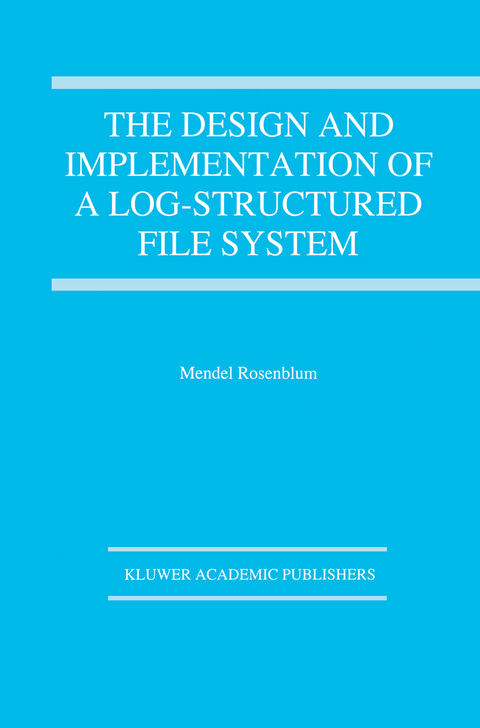
The Design and Implementation of a Log-structured file system
Seiten
2012
|
Softcover reprint of the original 1st ed. 1995
Springer-Verlag New York Inc.
9781461359333 (ISBN)
Springer-Verlag New York Inc.
9781461359333 (ISBN)
Computersystemsresearch is heavilyinfluencedby changesincomputertechnol- ogy. As technology changes alterthe characteristics ofthe underlying hardware com- ponents of the system, the algorithms used to manage the system need to be re- examinedand newtechniques need to bedeveloped. Technological influencesare par- ticularly evident in the design of storage management systems such as disk storage managers and file systems. The influences have been so pronounced that techniques developed as recently as ten years ago are being made obsolete. The basic problem for disk storage managers is the unbalanced scaling of hard- warecomponenttechnologies. Disk storage managerdesign depends on the technolo- gy for processors, main memory, and magnetic disks. During the 1980s, processors and main memories benefited from the rapid improvements in semiconductortechnol- ogy and improved by several orders ofmagnitude in performance and capacity. This improvement has not been matched by disk technology, which is bounded by the me- chanics ofrotating magnetic media. Magnetic disks ofthe 1980s have improved by a factor of 10in capacity butonly a factor of2 in performance.
This unbalanced scaling ofthe hardware components challenges the disk storage manager to compensate for the slower disks and allow performance to scale with the processor and main memory technology. Unless the performance of file systems can be improved over that of the disks, I/O-bound applications will be unable to use the rapid improvements in processor speeds to improve performance for computer users. Disk storage managers must break this bottleneck and decouple application perfor- mance from the disk.
This unbalanced scaling ofthe hardware components challenges the disk storage manager to compensate for the slower disks and allow performance to scale with the processor and main memory technology. Unless the performance of file systems can be improved over that of the disks, I/O-bound applications will be unable to use the rapid improvements in processor speeds to improve performance for computer users. Disk storage managers must break this bottleneck and decouple application perfor- mance from the disk.
1 Introduction.- 2 Disk Storage Manager Design.- 3 Motivation.- 4 Log-structured file systems.- 5 Sprite LFS cleaning policies.- 6 Experience with Sprite LFS.- 7 Related work.- 8 Conclusion.- 1 Index.
| Erscheint lt. Verlag | 4.10.2012 |
|---|---|
| Reihe/Serie | The Springer International Series in Engineering and Computer Science ; 303 |
| Zusatzinfo | XII, 132 p. |
| Verlagsort | New York, NY |
| Sprache | englisch |
| Maße | 155 x 235 mm |
| Themenwelt | Mathematik / Informatik ► Informatik ► Programmiersprachen / -werkzeuge |
| Informatik ► Theorie / Studium ► Algorithmen | |
| Informatik ► Theorie / Studium ► Compilerbau | |
| ISBN-13 | 9781461359333 / 9781461359333 |
| Zustand | Neuware |
| Informationen gemäß Produktsicherheitsverordnung (GPSR) | |
| Haben Sie eine Frage zum Produkt? |
Mehr entdecken
aus dem Bereich
aus dem Bereich
Buch | Softcover (2025)
Lehmanns Media (Verlag)
CHF 62,95
die Welt der generativen KI verstehen
Buch | Hardcover (2025)
Hanser (Verlag)
CHF 48,95
IT zum Anfassen für alle von 9 bis 99 – vom Navi bis Social Media
Buch | Softcover (2021)
Springer (Verlag)
CHF 46,15


